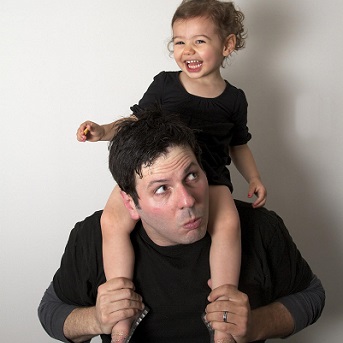Sometimes the most entrenched forms of prejudice can be the hardest to see and articulate. So it is with the latest drama written by Duncan Kidd, Being A Dad, performed by the Strange Town company at this year’s Just Festival and developed in association with the Fathers Network Scotland. By shedding light on the ways in which both institutions and individuals can often treat dads as the “other” identity in the parenting relationship, differentiated from the naturalness and social correctness of motherhood, Kidd and the young cast deliver a simplistic yet powerful performance with a message that refuses to be ignored.
Being a Dad is a brief, fragmented pastiche of modern paternity, moving through several distinct scenarios that each serve to highlight aspects of fatherhood as is it experienced today. Over the course of an hour, a lot of ground is covered – gay fathers, teenage fathers, absent fathers, single fathers – and many familiar paternal archetypes are deconstructed in the process. Far from being the stoical, undemonstrative breadwinners of old, this dramatisation presents fatherhood as an identity that is increasingly variegated, fluid and complex.
Providing continuity between the several narrative switches is a central journey taken by a police officer and a young inmate handcuffed together in a police van crawling through a city. The purpose of their journey is at first unclear, until at last it is revealed that the young inmate is about to go through one of the most important rites of fatherhood of them all. Through monologues and conversations, these two young fathers – in some respects social opposites, institutional enemies – are nevertheless united in their love for their children and their overriding, inescapable social identities as fathers.
The play utilises short scenes, rapid changes and sparse context; and at times can be hard to keep up with. However, the strength of the performances, the simplicity of the staging and the directness of the language combine to unite the different narrative threads effectively and with purpose. By the conclusion, a sense of social authenticity is created from the mosaic, so much so that you might feel like you have spent the past hour peering into living rooms and walking around street corners.
Being a Dad further prioritises the details over grander story arcs or fully-realised characterisation. This works on multiple levels, both conveying some of the messiness and daily desperation inherent to the parenting process; and demonstrating how the experience of being a dad can sometimes be best encapsulated in the smallest of things, whether the tininess of baby shoes, the vulnerability of singing a song or reading a story, the patronising glare of a nurse or acquaintance. At the more critical end, it arguably reflects the shallower legal and social recognition bestowed upon fatherhood in comparison to motherhood: it is hard to deny that paternal identities continue to be marginalised, with stay-at-home dads regularly seen as somehow emasculated and single fathers as suspicious.
Being a Dad, unsurprisingly for a piece of campaign theatre, is primarily designed to get the public engaged with the issues and, to this end, audience members are actively encouraged to share their thoughts with the researchers, cast and crew. However, there is enough humour and humane observation contained within it to save it from being overly instructive. And at a time of heightened social pressure in which one of the dominant discourses to have emerged focuses on a perceived “crisis of masculinity”, its overall messages deserve to be taken seriously.
And what are these messages? That being a dad is difficult and fundamental and crucial. That the unpacking of gender binaries will reinterpret masculinity at least as much as femininity. And that there are as many types of father as there are fathers in the world; and a dad is therefore never just one thing or the other.


Comments